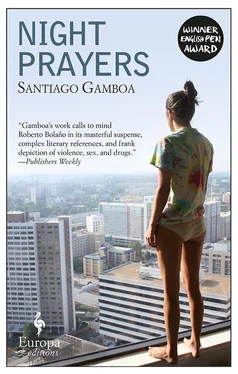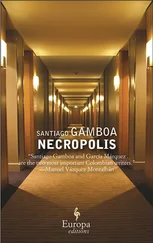Teresa also wept, but kept her distance, since she was holding Manuelito Sayeq. The guards said something to each other and continued with the gurney as far as the infirmary (I assumed). Juana hugged me again and for a second we were one and the same. I felt her grief, her guilt, perhaps her anger.
Soon afterwards the doctor came and shook his head, he was dead. I already knew that. We all knew. Then he handed over two folded sheets of paper.
“They were in his pocket,” he said.
One was for me, and said:
I told you, Consul, this wasn’t going to be a crime story, but a strange love story. Now I’m free, even happy, and with this freedom I abolish myself. At last.
The other was for Juana. She read it and read it, crying, and finally handed it to me.
“Please, Consul, read it.”
Dear sister. I wasn’t able to see you, I thought I could hold out, but I’ve been drowning more and more, and now there’s a way out and I don’t have any strength left. Forgive me for failing you. I asked the consul to look for you but I’m not sure he’ll succeed, time is up. Soon they’ll be coming for me. I seem to hear them, hear their steps, but they won’t find me. My life was always yours, but I have it on loan. I’ll give it back to you when you come to where I already am almost, where I will be forever. You don’t know the pleasure I feel seeing the liquid come out of my body, at last clean of that blood. This purity will suffice for both of us. With mine, I cleaned yours. I’m waiting for you where you know. If you read this it’s because they will have found you. A kiss.
Something bothered me, or rather made me indignant, didn’t they pass on the messages? didn’t he know that Juana was coming to see him? I went to one side (I didn’t want Juana, who was still crying in Teresa’s arms, to hear me) and asked the warden of Bangkwang: didn’t the lawyer send you my messages? weren’t you told the consul had found the prisoner’s sister? weren’t you told we were coming here? The warden looked surprised, which I didn’t understand, and when I repeated my question he said no, he didn’t know anything.
Then he called one of his men and asked him, but he just shook his head. Without asking permission I grabbed the phone and dialed the lawyer’s number. One ring, two, three. No reply. I couldn’t believe it, he hadn’t been given the message! They had killed him.
I insisted to the warden: it was important for us to clarify this, but he just looked up at the ceiling with a total lack of interest. I finally managed to speak with the lawyer:
“Of course I passed on the message, I dictated it by phone to the warden’s secretary and mentioned it was urgent!”
I told him what had happened and he said he would come immediately, that we should wait for him.
I asked to speak with the warden’s secretary, but I was told, which secretary? he didn’t have a secretary, there was a woman who took messages. I asked the warden and he said, no, I already told you, I didn’t get any message. They called the woman and somebody translated: nobody had left her a message like that, when do you say they called? The woman disappeared after a while and it was impossible to get her back.
At last the lawyer arrived and I said to him:
“Nobody received the messages and he never knew anything. It would have saved him.”
The old man chewed something, a leaf similar to a betel, and said, nobody kills themselves for something like that, at least in my country. He must have had his reasons.
“You killed him, you didn’t give him the message that would have saved his life, and you deceived us all.”
The old man spat through the window.
“I understand how upset you are, Consul, but didn’t you tell me the young man was going to plead guilty anyway?”
The blood rose to my head, and I had to make an effort not to hit him. Teresa noticed and came over. She said in my ear: calm down, there’s nothing you can do. He’s a son of a bitch, but you can’t touch him!
I was having difficulty breathing, but I managed to say to her:
“Manuel never knew I’d found Juana, or that she was in Bangkok! He cut his wrists only a short time ago, the blood on the floor was still liquid, do you realize? He killed him!”
“Yes,” Teresa said. “But don’t forget you’re representing your country. Later, you can make an official complaint, or piss in the Chao Phraya, but here you have to keep up appearances. If you touch him you’re going to give them the opportunity to kick up a fuss.”
We spent the rest of the day in Bangkwang, in a funeral chamber that was quite small but air-conditioned. When they brought in the body, in a coffin made of planks, Juana looked at her brother’s livid face for a time that to all of us seemed infinite. It started to get dark and the prosecutor (who had also arrived) said that we had to go, that they would be taking the body to the morgue, where it would be kept while they waited for his sister’s decision and the final legal procedures.
“Do you feel better?” I asked the prosecutor. “You must think your city is cleaner now.”
Teresa squeezed my arm.
“If only our problems were limited to lost and stupid young people,” he said, “although I know I mustn’t judge anyone who has taken his own life.”
“Doesn’t that seem to you sufficient demonstration of innocence?” I said.
He turned and lit a cigarette in a somewhat theatrical manner. “Not really,” he said. “To be honest, his death doesn’t demonstrate anything.”
“The pills weren’t his,” I insisted. “Someone put them in his case and you know it. Everybody knows it!”
Teresa glared at me again. The prosecutor seemed to lose patience.
“Eleven million tourists come here every year,” he said. “Many to have sex and take drugs, others to traffic, and some, simply, on vacation. There are bound to be victims.”
Saying this, he got in his car. But immediately he lowered the window and said:
“I forgot to give my condolences to his sister, please convey them to her from me. And please, let her decide quickly if she wants to repatriate him or bury him here. In this heat, bodies decompose.”
“I’ll tell her, don’t worry,” I said. “For now I trust in the quality of your cold chambers.”
When we got home, Teresa opened a bottle of gin and suggested we go out on the terrace and look at the river, the flow of the traffic, the clouds. Night had already fallen. Juana still couldn’t say anything. Around her eyes a purplish ring had settled, as if her eyelids were raw.
The Chao Phraya reflected the hallucinatory lights of the city, its iridescence. Teresa sat down next to me and we drank in silence, one glass after another. When Manuelito Sayeq fell asleep Juana came out again. I put a lot of ice in a glass and offered her a drink.
“I’d like a double, Consul, thank you.”
“It’s the only thing we can do,” I said. “My condolences.”
She thanked me for looking for her and bringing her here from Tehran, allowing her to get to him, even though it was too late.
“I can’t help thinking,” Juana said. “If only we’d come yesterday…”
That was nagging at me too: if only the Consular Department had given a rapid answer, if only I’d taken the decision to travel earlier, if only the Thai legal authorities hadn’t brought the trial forward. If only, if only…
“If only I’d written an e-mail or a Facebook message, or called him on his cell phone,” Juana said, “he’d be alive, it’s all so…”
She started crying again. Teresa hugged her.
“Don’t think anymore, Juana,” I said, “nothing’s going to bring him back. You will have him in your son.”
Читать дальше












